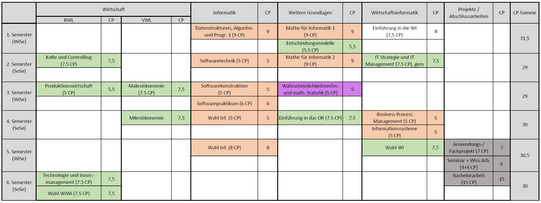Bachelor of Information Systems
The Bachelor's degree course in Information Systems at TU Dortmund University builds a bridge between the degree courses offered by the Department of Computer Science and the Faculty of Business Administration and Economics.
The Bachelor's degree course in Information Systems provides students with in-depth specialist knowledge of how computer science can be used to design economic processes and solve challenges in companies. The fields of economics and computer science are therefore a sought-after combination on the job market and of particular relevance to society.
The IT knowledge acquired during the course can be used to optimize various economic processes and solve problems in companies. The degree therefore offers numerous opportunities for a successful career start in software development, project management, product management, or the analysis of large amounts of data.
The degree program covers the following three areas in particular
- Data Management & Applied Artificial Intelligence,
- Business Engineering & Process Automation and
- Digital Transformation in Business and Society.
A consecutive Master's degree course in Information Systems is due to start in the winter semester of 2025/2026.

Below you will find a provisional sample study plan for the start of the winter semester with its various modules.
A detailed description of the individual modules and their examination regulations will follow in the next few weeks.

Structure of the Bachelor's degree program in Information Systems
The Bachelor's degree course in Information Systems is a full-time, on-campus course with a standard period of study of six semesters (three years) and leads to a Bachelor of Science (B.Sc.) degree.
Information Systems (green and orange and white) In courses offered by the Departments of Business and Economics and Computer Science, you will acquire knowledge of Information Systems, which, for example, deepens aspects of process automation, digital work, and information management.
Business and Economics (green) In the courses of the Department of Business and Economics, you will learn the basics and specialized knowledge in several courses, which, for example, deepen aspects of controlling, entrepreneurship or economics.
Computer Science (orange) In the courses of the Department of Computer Science, you will learn the basics and specialized knowledge in several courses, which, for example, deepen aspects of intelligent systems and artificial intelligence or software, security and verification.
Other fundamentals (green, orange and pink) In courses offered by various faculties, you will acquire knowledge of the mathematical foundations of computer science and decision models in operations research.
Practice in the Bachelor's degree program
You will not only apply the knowledge gained in lectures in tutorial groups, but also in the practical courses integrated into the curriculum. In the software course, you will work on challenging software projects in groups to gain valuable programming experience and skills such as teamwork and project management. The undergraduate project also involves working on challenging tasks in a group.
Information for prospective students on application and enrollment: TU Dortmund University campus portal

![[Translate to English:] [Translate to English:]](/storages/zentraler_bilderpool/_processed_/d/f/csm_Informatik_777f60dc25.jpg)

![[Translate to English:] [Translate to English:]](/storages/zentraler_bilderpool/_processed_/1/b/csm_Figuren-nachdenklich_0daa1f91f8.jpg)
![[Translate to English:] [Translate to English:]](/storages/cs/_processed_/6/f/csm_teamwork1_e113f5f13b.png)
![[Translate to English:] [Translate to English:]](/storages/cs/_processed_/e/1/csm_header_ee496f74bf.png)